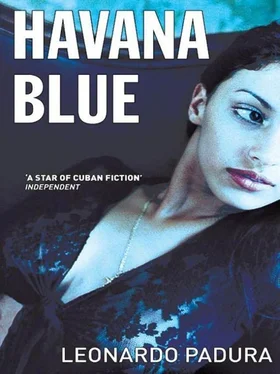He poured himself a less generous second cup of coffee, thanked his stomach for sparing him a punitive ulcer, lit up again and walked into his bedroom, congratulating himself on the quality of his lungs. He sat on his bed, by the telephone, and watched Rufino, his fighting fish, embark on a solitary circular dance. He then looked at his empty room and felt he too was circling round and round, in an attempt to find the tangent to take him out of that infinite circle of anguish.
“We’re well and truly fucked, Rufino,” he said, then dialled Manolo’s number and heard it ring. “Hello,” said a woman’s voice as she picked up the receiver.
“Alina? It’s the Count, how are you?” he enquired fearfully, for he was familiar with that lady’s stress with telephones and before she could reply he jumped in: “Your son up yet? Get him on that phone, tell him I’m in a hurry.”
“Ah, Manolito. Hey, Count, he stayed over at Vilma’s, his current girl friend, you…”
A good catch, he felt like saying, but he took the easy option:
“Look, Alina, do me a favour. Call him and tell him to pick me up in half an hour. It’s urgent business. You OK? See you and thanks, Alina.” He sighed and hung up.
He drank his coffee slowly. Was fascinated by the ease with which Manolo switched girlfriends and persuaded them to let him sleep over. He, however, was enduring a long spell of solitary, and although he’d have preferred not to, he thought of Tamara, saw her in the tight-fitting tracksuit or yellow dress, marking out her knickers, and she was mouth-watering. Perhaps Manolo and the Boss were right: he should watch out for himself, and he thought he’d prefer not to see her or talk to her again, to keep her far from his mind and avoid frustrations like the previous night’s, not even the drinking session with Skinny had tamed his desires, and he’d finished off the night by masturbating in honour of that unforgivable woman. Only then had he been able to get to sleep.
This is where Rafael Morín came from, he muttered as he walked towards the room at the back. Fame and paint had long deserted the big house on the Avenue of October Tenth, now a creaking sweaty ruin, where each room in the ancient mansion was an individual home with a communal bathroom and washhouse at the back, flaking walls with generations of graffiti, an ever-present smell of gas and a long overburdened washing line on that Sunday morning. “The pit and the peak,” quipped Manolo, and he was right. That dark promiscuous rooming house seemed so remote from the residence on Santa Catalina that one could easily think they were separated by oceans, mountains and deserts and centuries of history. But Rafael Morín had been born on this shore, in room number seven, right at the back, next to the communal bathroom and washhouse now occupied by two women unafraid of the cold or life’s other contingencies.
They greeted the women and knocked on the door of number seven. The latter looked at them, recognized their business and policemen’s airs, had no doubt heard of Rafael’s disappearance and returned to their washing only when the door opened.
“Hello, María Antonia,” said the lieutenant.
“Hello,” the old woman replied, and her eyes had a scared, hunted-animal look. The Count knew she was barely sixty, but life had dealt her such hard knocks she seemed more like eighty, long-suffering and with no will to keep going.
“I’m Lieutenant Mario Conde,” he said, showing his card, “and this is Sergeant Manuel Palacios. We’re responsible for your son’s case.”
“Please do come in and ignore the mess, I’m like that…”
The room was smaller than Tamara’s father’s library yet contained a double bed, a cabinet, a sideboard, an armchair, a dressing-table chair and a colour television on a small wrought-iron table. A curtain hung down by the television, and the Count imagined it must hide the way to the kitchen and perhaps an inside lavatory. He tried to see the mess she’d warned about and saw only a blouse draped on the bed and a linen bag and ration book on the sideboard. In one corner of the room stood a Virgen de la Caridad del Cobre lit by the blue flame from a languishing candle.
The Count sat down in the chair, Manolo took the armchair and María Antonia teetered on the edge of her bed and asked: “Is it bad news?”
The Count looked at her and felt ill at ease: that luckless woman’s life must gravitate round her son’s triumphs, and Rafael’s absence perhaps robbed her of her only reason to exist. María Antonia seemed extremely fragile and sad, so much so that the Count caught himself sharing her sadness, and he wanted to be far from that spot, immediately.
“No, María Antonia, there’s no news,” he said finally and repressed his desire for a smoke. There were no ashtrays in the room. He decided to fiddle with his pen.
“What an earth has happened?” she asked, although she was really talking to herself. “I don’t understand it at all. What can have happened to my son?”
“Madame,” said Manolo, leaning towards her. “We’re doing all we can, and that’s why we’ve come to see you. We need your help. OK? When was the last time you saw your son?”
The woman stopped nodding and looked at the sergeant. Perhaps she thought he looked very young, and she rubbed her long bony hands gently together. The room was damp, and the cold sticky.
“He came at midday on the thirty-first to bring me my New Year present, that perfume over there,” and she pointed to the unmistakable bottle of Chanel N° 5 on the sideboard. “He knew my only weakness was for perfumes and was always giving them to me as presents. For Mother’s Day, for my birthday, for New Year. He used to say he wanted me to smell sweeter than anyone else in the barrio, just imagine. And at night he called my neighbour’s phone to wish me good luck. He was at that party he’d gone to, and it must have been around ten to twelve. He always rang me, from wherever he was, last year he called from Panama, right, I think it was Panama.”
“And did he have lunch with you?” continued Manolo, shifting his skinny rump onto the edge of the armchair. He liked asking the questions and when doing so he’d hunch up, like a cat whose fur was bristling.
“Yes, I made him beans and sausage, the way he liked it, and he said neither his wife nor mother-in-law could cook them the way I did.”
“And how did he strike you? The same as usual?”
“What do you mean, comrade?”
“Nothing in particular, María Antonia, did he seem at all nervous, worried or different?”
The old lady looked up at the Virgin and then rubbed her legs, as if trying to relieve pain. Her hands were white, and her nails spotless.
“He was always stressed by problems at work. He said: you won’t believe this, mummy, but I’ve got to spend the afternoon at the office, and he left around two.”
“And did he seem anxious or on edge?”
“Look, comrade, I know my son very well: I gave birth to him and brought him up. He ate the beans and sausage at around one, and then we both washed up and lay on this bed and talked, as we always did. He liked stretching out on this bed, my poor son. He was always tired and sleepy, and his eyes would shut as we spoke.”
“And what time did he leave?”
“At around two. He washed his face and told me he was going to a party that night, that he had lots of work on, and gave me two hundred pesos so you can buy yourself something for New Year’s Eve, he said and he went to clean his teeth and comb his hair and gave me a kiss and left. He was as loving towards me as ever he was.”
“Did he always give you money?”
“Always? No, just occasionally.”
“Did he mention any problems he was having with his wife?”
Читать дальше











